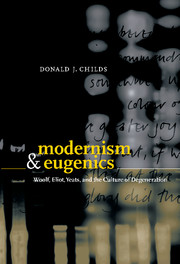Book contents
- Frontmatter
- Contents
- Introduction
- Chapter 1 Virginia Woolf's hereditary taint
- Chapter 2 Boers, whores, and Mongols in Mrs. Dalloway
- Chapter 3 Body and biology in A Room of One's Own
- Chapter 4 Eliot on biology and birthrates
- Chapter 5 To breed or not to breed: the Eliots' question
- Chapter 6 Fatal fertility in The Waste Land
- Chapter 7 The late eugenics of W.B. Yeats
- Chapter 8 Yeats and stirpiculture
- Chapter 9 Yeats and The Sexual Question
- Notes
- Index
Introduction
Published online by Cambridge University Press: 22 September 2009
- Frontmatter
- Contents
- Introduction
- Chapter 1 Virginia Woolf's hereditary taint
- Chapter 2 Boers, whores, and Mongols in Mrs. Dalloway
- Chapter 3 Body and biology in A Room of One's Own
- Chapter 4 Eliot on biology and birthrates
- Chapter 5 To breed or not to breed: the Eliots' question
- Chapter 6 Fatal fertility in The Waste Land
- Chapter 7 The late eugenics of W.B. Yeats
- Chapter 8 Yeats and stirpiculture
- Chapter 9 Yeats and The Sexual Question
- Notes
- Index
Summary
Before eugenics was born as a science in the work of Francis Galton late in the nineteenth century, the concerns that it would address were gathering. On the one hand, the age of European exploration confronted Europe with races and cultures that had to be explained in terms of the assurance in the Book of Genesis that we all descend from Adam and Eve. As late as the nineteenth century, many ethnologists and anthropologists were content to assume that all human beings indeed descended from Adam and Eve, but that some branches of the human species had been cursed for their sins and so had degenerated from their original noble state. On the other hand, in Galton's Britain, increasing urbanization confronted the middle class with an apparently permanent underclass of poor people – beggars, thieves, prostitutes – often in poor health, apparently indolent and lazy. This underclass, moreover, was increasing in size relative to the middle class because of the differential birthrate, and increasing also was the frequency of such social problems as murder, pauperism, disease, mental illness, alcoholism, and prostitution. Was the British nation degenerating – its very survival threatened by the potentially fatal fertility of its degenerates?
As early as 1871, analysis of records of the height, weight, and general health of army recruits throughout the nineteenth century in Britain suggested “a progressive physical degeneracy of race.”
- Type
- Chapter
- Information
- Modernism and EugenicsWoolf, Eliot, Yeats, and the Culture of Degeneration, pp. 1 - 21Publisher: Cambridge University PressPrint publication year: 2001



